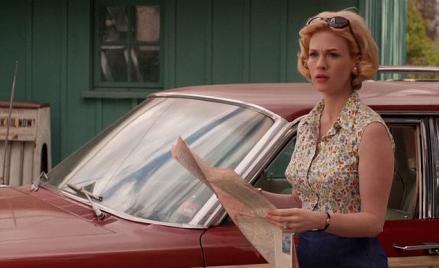What a pleasure this episode was; the first half was mostly devoid of great drama and yet bounced along in such an agile fashion, from arc to arc, that the intense action of the second half naturally followed. On most other shows these sort of doings would be subject to endless teaser ads: Will Don and Betty get back together for one night of passion? Who will Peggy stab with a freaking spear? Here it’s all of a piece.
It was Peggy’s episode as much as Don’s. In an early scene she was beckoned to settle a dispute between Ted and Don (over margarine), and she won’t decide between the two men. Don confronts her later: “There’s a right and there’s a wrong,” he says, even with margarine. But Peggy will have none of it; she feels caught out and is getting sick of it. “He’s interested in the idea,” she says of Ted Chaough. “And you’re interested in your idea.” Ted is also interested in Peggy and seems in fact to be afflicted with a bad case of Peggy Fever, but he’s bubbling over with scruples (another sharp contrast to Don), yelling at her for touching his hand.
Peggy is caught. She’s caught between Don and Ted, unsure of her future in a company that doesn’t yet have a name, and also caught between Ted and Abe, her mustachioed boyfriend whom she comes home to find stabbed, attended by a policeman, and refusing to identify his attackers for fear that the cops (“fascist pigs!”) will harass people in the neighborhood. He’s going to write a story about it, he says
Peggy is scared for her safety. “I’m going to sell this shithole,” she says, which means that Abe won’t have a home, either. She’s created this situation by trying to give Abe what he wanted. There’s a saying, “Adults have adult problems.” And Peggy has a lot of them, never more so than when she accidentally stabs Abe with a protective spear she rigged up, leading to one of the great bits of dialogue this season:
Abe: Your activities are offensive to my every waking moment. I’m sorry. But you’ll always be the enemy.
Peggy: Are you breaking up with me?
Abe: I got to hand it to you. You gave me a great ending to my article.
Having Peggy nearly kill her boyfriend, putting that responsibility on her shoulders, then having him dump her over her ethics is a magnificent move. And yet it’s a relief; that relationship was holding her back from something—perhaps from Ted, or Stan Rizzo (not likely after last week’s speed binge), or from some sort of professional awakening.
Don, after passing judgment on Peggy, leaves Megan to visit his son Bobby at camp. He runs into Betty on the way, traveling solo. You can see where it’s going (there’d been some foreshadowing with Betty flirting with a fellow at a fundraiser), but Don can’t see, not right away. “You know mosquitoes ignore me,” says Betty. “In those shorts?” says Don. Then, a little later, Betty says, “I don’t know what’s happened, but I’m all bit up.” My goodness. Their scenes together are like flashbacks to earlier seasons, and the score would have been at home in a Hitchcock film.
With great drama comes portentous dialogue, and there was some epigrammatic excess. “Why is sex a definition of being close to someone?” Don asked. And soon after says: “Just because you climb a mountain doesn’t make you love it.”
“That poor girl,” said Betty of Megan. “She doesn’t know that loving you is the worst way to get to you.”
Poor Megan, who is becoming a ghost, forced to wear a wig to play her own sister on her soap opera, pressed into unwanted kisses from her co-star Arlene, lost. When Don finally comes home, she tells him: “Something has to change.”
“You’re right,” he says. “I haven’t been here.”
We know where he’s been. He’s been begging Sylvia to stay with him, he’s been at work, he’s been living in his own past. He’s been anywhere but here, presumably because loving Don is the worst way to get to him.
But wait! The Don Draper of this episode seemed remarkably unmysterious. Not particularly dangerous. To please Bobby he raised his hand to sing the song about father Abraham, a typical dad at a typical camp, enjoying fatherhood, a moment with ex-wife and son. The next morning when he saw Betty laughing with Henry Francis, his face registered loss. He might not just be looking for comfort from Megan; he might be able to perceive her aloneness. Then again, it took a night with his ex-wife to get him there, and as Betty said, “I’m thinking about how different you are before and after. I love the way you look at me when you’re like this. But then I watch it decay. I can only hold your attention so long.”
The tragedy for the women who love Don Draper is that his attention always wanders. “I keep trying to make things the way things used to be,” says Megan, “but I don’t know how.” And this is something that we know, as the audience, better than any of the women in Don’s life: the way things used to be, the way they really used to be, back when Dick Whitman was a fatherless boy, was joyless, loveless, and unsettled. If you make a home for him, and it’s a place of love and comfort, then he will not feel at home.
Dammit, I made you a wallet,
Paul
